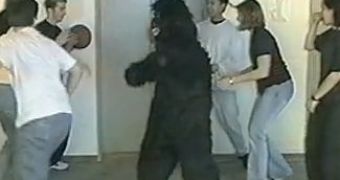When focusing on a certain action or event, people tend not to see anything else around them. This phenomenon is called “inattentional blindness” and it happens more often than you would think.
A certain Daniel Simons, a professor of psychology and in the Beckman Institute at the Univeristy of Illinois, made a study that supports this theory. For his research and observations he made a first video in the late 1990s with his collaborator Christopher Chabris, now a psychology professor at Union College in New York; before showing it to its subjects, he asked them to focus on a certain action.
This video presented two groups of people, some in white shirts and some in black shirts, throwing a ball at one another. Simons demanded the video viewers to count only the passes of people in white shirts. At the end of the video, many viewers had counted the correct number of passes but did not see the gorilla that entered the scene, stopped to face the camera, pounded on its chest and walked away. The amazing thing is that almost half of the subjects failed this test, even if the gorilla was in view for nine seconds. This first test advances the theory that people who focus on one thing, usually miss details that are otherwise obvious.
To test this statement, Daniel Simons made a new experiment, on another group of people, whether they had seen or not the gorilla video. Same two groups of people throwing passes, half in white and half in black and the same indication of counting the passes of those in white given to the subjects. The results were not contradicting the first theory; people that already knew Simons' previous video, saw the gorilla. The thing is that only 17 percent of people familiar with the first gorilla video saw one or both of the other two events in this scene (one person wearing black leaving the scene and the color change of the background) and 29 percent of those unfamiliar with the first video spotted one of the other events.
The conclusion of these two experiments is that knowing that something might happen does not open your eyes at every unexpected thing that is actually happening. “The main finding is that knowing that unexpected events might occur doesn't prevent you from missing unexpected events," Simons said. This second video was a finalist in the Neural Correlate Society's Best Illusion of the Year contest in May 2010.
After watching the two videos before reading the description and conclusions of the experiment, Simons' theory is every bit right.

 14 DAY TRIAL //
14 DAY TRIAL //